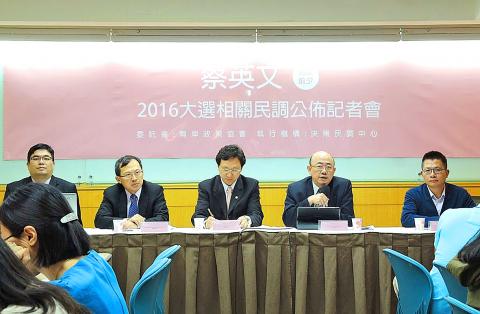Prior to Democratic Progressive Party Chairperson Tsai Ing-wen’s (蔡英文) trip to the US today, a survey released yesterday showed that 66.1 percent of Taiwanese believe that her policy of maintaining the “status quo” in cross-strait relations corresponds to the US’ cross-strait policy.
The poll released by the Cross-Strait Policy Association showed that only 13.2 percent of respondents held the opposite view.
Cross-Strait Policy Association president Tung Chen-yuan (童振源) said he expected the US would want Tsai to clarify her views on her “maintaining the status quo” remarks and to know how she would go about doing so.

Photo: CNA
The poll showed that 37.1 percent of respondents believe that her trip would not affect her presidential campaign, while 32.3 percent said it would.
The poll was conducted on Monday and Tuesday, with 1,171 valid samples from people randomly selected from telephone books.
The poll found that Tsai led over all her potential Chinese Nationalist Party (KMT) rivals, even in northern Taiwan — notably Taipei, New Taipei City and Keelung — which have traditionally been a stronghold for the pan-blue camp.
Whether against KMT Chairman Eric Chu (朱立倫) or Legislative Speaker Wang Jin-pyng (王金平), Tsai would win by a large margin, even in the north, the poll showed.
Facing Chu, Tsai would have 57.1 percent support over Chu’s 33.8 percent nationwide, while 14.2 percent of respondents said they were undecided. Against Wang, Tsai had the support of 51.3 percent of respondents nationwide, while Wang had 31.7 percent of the support, with 16.8 percent of the respondents saying they are still undecided, the poll found.
Breaking down the figures geographically, even in Taipei, New Taipei City and Keelung, Tsai garnered the support of 57.4 percent of respondents against Wang’s 28.4 percent; and when running against Chu — who is serving his second term as New Taipei City mayor — Tsai still has 52.1 percent of support against Chu’s 36.3 percent in the three cities, the poll found.
Jet-Go Consulting Group (戰國策顧問) chairman Wu Chun-cheng (吳春城) said the poll might indicate people are tired of the KMT.
“When Tsai first announced her presidential bid [last month], a poll conducted without identifying her rival showed that she only had a little over 30 percent support,” Wu said. “However, if you compare Tsai against other KMT rvials, she immediately has more than 50 percent support.”
“This shows that the 20 percent growth might come from people who simply do not like the KMT,” he said.

TRAGEDY STRIKES TAIPEI: The suspect died after falling off a building after he threw smoke grenades into Taipei Main Station and went on a killing spree in Zhongshan A 27-year-old suspect allegedly threw smoke grenades in Taipei Main Station and then proceeded to Zhongshan MRT Station in a random killing spree that resulted in the death of the suspect and two other civilians, and seven injured, including one in critical condition, as of press time last night. The suspect, identified as a man surnamed Chang Wen (張文), allegedly began the attack at Taipei Main Station, the Taipei Fire Department said, adding that it received a report at 5:24pm that smoke grenades had been thrown in the station. One man in his 50s was rushed to hospital after a cardiac arrest

A car bomb killed a senior Russian general in southern Moscow yesterday morning, the latest high-profile army figure to be blown up in a blast that came just hours after Russian and Ukrainian delegates held separate talks in Miami on a plan to end the war. Kyiv has not commented on the incident, but Russian investigators said they were probing whether the blast was “linked” to “Ukrainian special forces.” The attack was similar to other assassinations of generals and pro-war figures that have either been claimed, or are widely believed to have been orchestrated, by Ukraine. Russian Lieutenant General Fanil Sarvarov, 56, head

SAFETY FIRST: Double the number of police were deployed at the Taipei Marathon, while other cities released plans to bolster public event safety Authorities across Taiwan have stepped up security measures ahead of Christmas and New Year events, following a knife and smoke bomb attack in Taipei on Friday that left four people dead and 11 injured. In a bid to prevent potential copycat incidents, police deployments have been expanded for large gatherings, transport hubs, and other crowded public spaces, according to official statements from police and city authorities. Taipei Mayor Chiang Wan-an (蔣萬安) said the city has “comprehensively raised security readiness” in crowded areas, increased police deployments with armed officers, and intensified patrols during weekends and nighttime hours. For large-scale events, security checkpoints and explosives

PUBLIC SAFETY: The premier said that security would be tightened in transport hubs, while President Lai commended the public for their bravery The government is to deploy more police, including rapid response units, in crowded public areas to ensure a swift response to any threats, President William Lai (賴清德) said yesterday after a knife attack killed three people and injured 11 in Taipei the previous day. Lai made the remarks following a briefing by the National Police Agency on the progress of the investigation, saying that the attack underscored the importance of cooperation in public security between the central and local governments. The attack unfolded in the early evening on Friday around Taipei Main Station’s M7 exit and later near the Taipei MRT’s Zhongshan